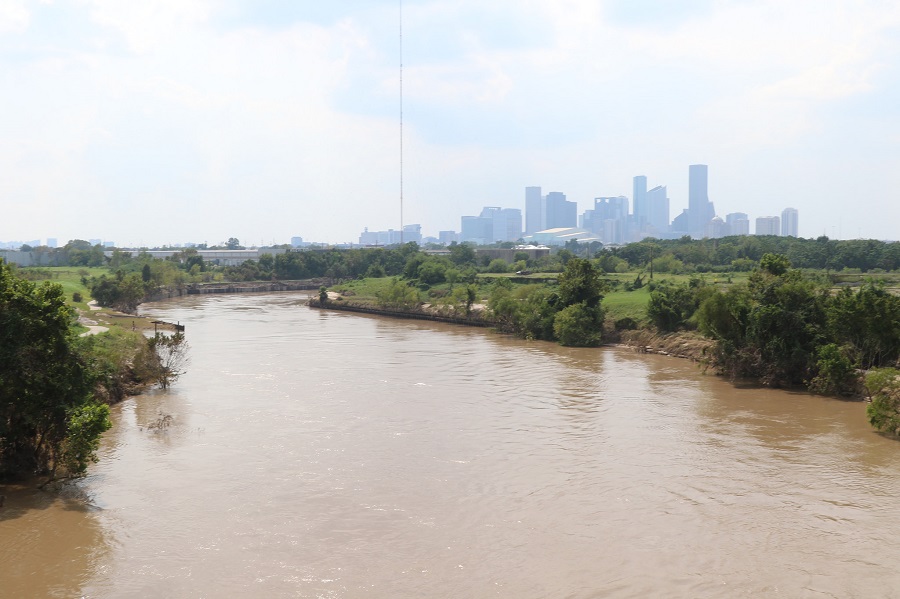
- More Than 60 People Have Died or Are Feared Dead as a Result of Harvey [Houston Chronicle]
- FEMA: More Than 90,000 Residential Structures in Harris, Galveston, and Fort Bend Counties Damaged by Floods [Houston Chronicle]
- Water Continues To Rise in West Houston Neighborhoods [KHOU]
- The Effect Harvey Could Have on Houston’s Real Estate Market [San Antonio Express-News ($)]
- Ongoing Labor Shortage in Construction Industry Could Slow Harvey Recovery [Houston Chronicle]
- Size and Duration of Harvey ‘Beyond Anything’ TxDOT Has Experienced Before [The Texas Tribune]
- Landlords Demanding Rent on Flooded Houston Homes [The Guardian]
- Eviction Notices Affecting Hundreds of Local Renters [Houston Chronicle]
- Headcounts Fall at Shelters, Though Thousands Still Remain at GRB, NRG Park [Houston Chronicle]
- KHOU Begins Cleanup To Return to Flooded Studios [Mike McGuff]
- Aqua Dam Saves Lake Jackson Home from Floodwaters [Click2Houston]
- Rep. Dan Huberty Calling for Investigation into Decision To Open Floodgates in Kingwood Area [Click2Houston]
- An Illustrated Guide To How the Barker and Addicks Dams Work [OffCite]
- How to Divide Your Debris for Garbage Pickup [abc13]
- Tips on Salvaging Your Flood-Damaged Home and Belongings [Houston Chronicle]
- Photos Compare Meyerland Before and After the Flood [Houston Chronicle]
- Photos: Bayou Bank Collapses East of Jensen Bridge [Houston Streetwise]
- FEMA Extends Grace Period for Paying Flood Insurance Premiums [Houston Chronicle]
- Will Past FEMA Problems Resurface in Harvey Recovery? [Houston Chronicle]
- Thieves Allegedly Looted Flooded Home with Victim Still Inside [abc13]
- Arkema Lifts 1.5-Mile Evacuation Order Around Crosby Chemical Plant [abc13]
- Now Houston Braces for a Mosquito Swarm [Texas Monthly]
- Houston Area Under Alert for Ground-Level Ozone [Click2Houston]
- Recreational Boating Temporarily Banned on Swollen Waterways in Brazoria County [abc13]
- FAA Quickly Issues Drone Operating Permits for Rescue Workers, First Responders To View Harvey Disaster [abc13]
- How Social Media Emerged as a New Civic Infrastructure During Harvey [Houston Chronicle]
- How Coding Group Sketch City Is Helping with Harvey Relief Efforts [Texas Standard; previously on Swamplot]
- Houston Community Fed Thousands of First Responders [Time]
- Eric Berger: Harvey Must Be a Wake-Up Call To Stop Business as Usual [Houston Chronicle]
Photo: Christof Spieler via Swamplot Flickr Pool
Headlines





I’ve seen posts and articles going both ways on tenants rights with regards to flood damaged apartments.
From the Guardian – “Under the Texas property code, if a rental premises is “totally unusable†due to an external disaster then either the landlord or tenant can terminate the lease through written notice. But if the property is “partially unusable†because of a disaster, a tenant may only get a reduction in rent determined by a county or district court.”
Any amount of water in your unit, until repaired seems like totally unusable. Don’t tell me i can use the upstairs, etc. Now a second or higher floor unit with no water damage, just a damp parkinglot seems like totally usable or partially at the very least.
Other articles, including some from local attorneys make it clear, if you cannot live there you can file to terminate your lease.
So any clarity?
The Guardian is to the Left, as Faux News is to the Right. Take it for what it is worth.
Hypothetical conversation ” So, Mr or Ms Landlord, what you are saying is that until I actually see the toxic black mold â„¢ growing BEHIND the sheetrock, my home is ‘habitable’ ” ?
If he or she (ze?) answers in the affirmative “Fine. If I find so much as one molecule of Toxic Black Mold â„¢ growing, or I exhibit even one symptom of exposure to said toxic substance, I will call Jim Adler, the Texas Rattlesnake â„¢, and sue your sorry *** for TEN ZILLION DOLLARS!!! Now, let’s talk about that lease termination, shall we”?
As if the landlords don’t have insurance for loss of rental income given such circumstances !!!
What we’re doing is simple, and you’d think the law would be too. If someone’s unit is a total loss, then obviously the owner can’t force them to stay and pay and the tenant can’t force the owner to provide the unit in working order.
.
Next is where logic comes in. If the owner has another similar unit in the building, they should make it available to any tenant that lost their apt. And I’d suspect the law would support the lease staying active (as in tenant can’t just say “see ya”) if a like unit is made available.
.
Where the gray line comes in, and we’ve seen it, is where you have tenants with very minimal unit damage. Say some roof leaks that caused some drywall to get wet. Or some water that came in from the door that can be easily remediated. As long as the owner is making their best effort to remediate, the lease should stay in effect.
.
Beyond that, customer service of the property plays a roll. Do you HAVE to offer late fee forgiveness to people that paid late due to the storm? No, but not doing so would be sort of dickish and would cost you more in bad will. Do you HAVE to prorate someone’s rent that had damages? No, but you SHOULD.
.
We’ve had people come to us and say “My unit was flooded 6 feet up and still has 4 feet of water. Everyone had to leave”. Those people we’re happy to help, however we can (even putting them up for free short term). But if someone says “My mean landlord won’t let me out of my lease even though I have a tiny water spot on my ceiling. So will you rent me a unit?”. We’re likely to say “Uh, no” as 1) we want to make room for people who NEED a unit and 2) that doesn’t sound like the tenant we’re going to want long term.
“As if the landlords don’t have insurance for loss of rental income given such circumstances !!!”
.
I bet a bunch of them don’t.
Some of our properties have loss of rents as part of our general property insurance. But property insurance is for everything but flood.
.
The only properties we have that have flood insurance are a few that are in the floodplain. But even those don’t have loss of rents as part of the policy (at least I’m pretty sure they don’t). And on ours, unless the property is a TOTAL loss, the deducible makes filing a claim not even worth it.
.
PS, I had made a comment before how I was surprised at how few takers we get when we offered units to people that lost their homes. In the last few days we’ve seen a giant uptick in people looking. I guess people were waiting for things to shake out. Our mangers, who normally are instructed to text and email 3-4 times before finally assuming someone isn’t interested are now reaching out maybe 1-2 times. Given how many people they’re trying to reply to, I think just making sure they reply back quickly is fair enough. If the person doesn’t reply back after we reach out, how serious could their situation really be?
Or… what if a rental tenant brings to the attention of a landlord that the sheetrock and flooring need to be replaced in order for the home to be habitable. Then, the Landlord agrees and ends the lease, deems the costs associated with repair to be uneconomical and tears down the house. The family living there has no place to go as every rental property in the same price strata has been leased. What then? This is not a rhetorical question. I have TWO close friends with young children in this situation. Landlord wants to tear down the homes because repairs too costly. Both families have money to pay rent, but can’t find a home to rent. Advice is welcome.